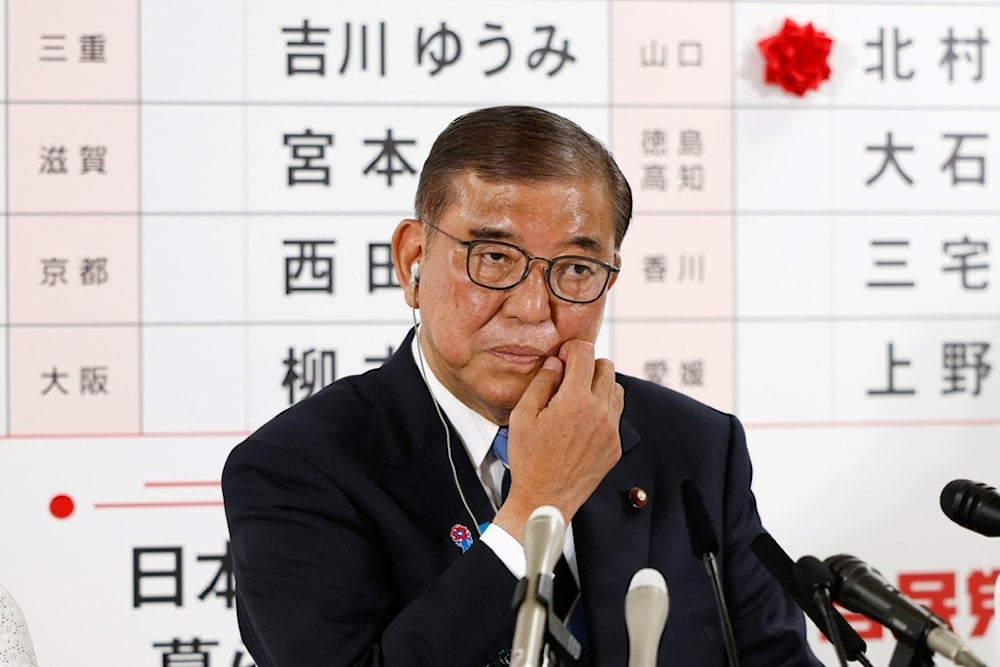Japan's PM set to resign after election defeat sparks LDP turmoil
Japan's Prime Minister Shigeru Ishiba is set to resign less than a year into his term after the LDP's crushing election losses, opening the way for a leadership contest amid party turmoil and public discontent.
-

FILE - Shigeru Ishiba, Japan's Prime Minister and president of the ruling Liberal Democratic Party (LDP) meets the media at the LDP headquarters in Tokyo, Sunday, July 20, 2025. (AP)
Japan's Prime Minister Shigeru Ishiba is preparing to step down, according to Japanese media, as pressure mounts within the ruling Liberal Democratic Party (LDP) for a leadership contest following disastrous losses in the July upper house elections.
Ishiba, 68, became LDP leader less than a year ago but has since watched the party lose its majority in both chambers of parliament, a collapse that has left his government unable to push through legislation. Public broadcaster NHK reported that Ishiba's decision is meant to "avoid a split in the party," while the Asahi Shimbun said he could no longer withstand intensifying calls for him to quit.
On Saturday evening, Agriculture Minister Shinjiro Koizumi and a former prime minister met Ishiba to urge him to resign voluntarily. NHK added that he is expected to formally announce his departure at a press conference later Sunday.
Leadership Turmoil
The resignation comes after weeks of turmoil. Four senior officials, including the party's number two, Hiroshi Moriyama, offered to resign last week, while powerful former premier Taro Aso, 84, pressed Ishiba to step aside. Dissenters say Ishiba must take responsibility for the electoral humiliation, while others warn that forcing him out through backroom deals only reinforces the perception of old-style LDP factionalism that has eroded public trust.
A formal request for a new leadership election is expected to be submitted Monday. If approved, a contest will follow to replace Ishiba, whose term was originally set to run until September 2027. The leadership race is anticipated in early October, with potential successors already jockeying for position. Hardline nationalist Sanae Takaichi, runner-up in the 2024 leadership race, has all but declared her candidacy. Koizumi, seen as a reformist and popular with younger voters, is also considered a strong contender, alongside Chief Cabinet Secretary Yoshimasa Hayashi.
Uncertain Future
Public opinion, however, is mixed. A Nikkei poll conducted at the end of August showed that while Takaichi was viewed as the most "fitting" successor, 52% of respondents opposed holding a leadership race at all. Some surveys also indicated that Ishiba's cabinet was regaining ground after concluding tariff agreements with the United States and reversing rice policy to boost production.
Online, the hashtag "#Ishiba Don't Quit" trended as supporters urged him to remain in office, highlighting his reputation as a moderate and diligent politician. Yet rising food prices, falling living standards, and persistent corruption scandals within the LDP have fueled voter disillusionment and strengthened smaller populist parties like Sanseito.
Read more: Tokyo caught between US uncertainty, China’s rise: Japan Times
For Ishiba, a career politician who finally won the LDP leadership on his fifth attempt last year promising a "new Japan," his resignation marks an abrupt end to a long-sought premiership. His departure opens a new chapter of uncertainty for the LDP, which, despite nearly unbroken rule since 1955, now faces one of its deepest crises in decades.

 3 Min Read
3 Min Read










